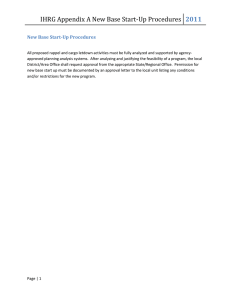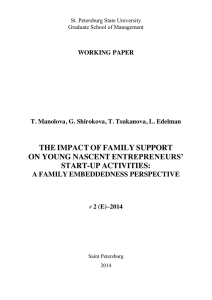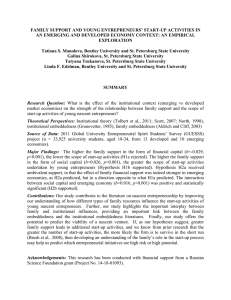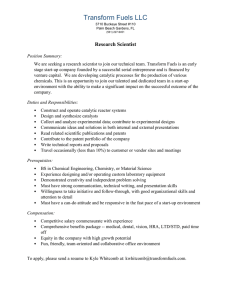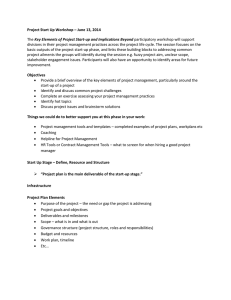Overcoming Institutional Voids: The Impact of Family Support on Youth
advertisement
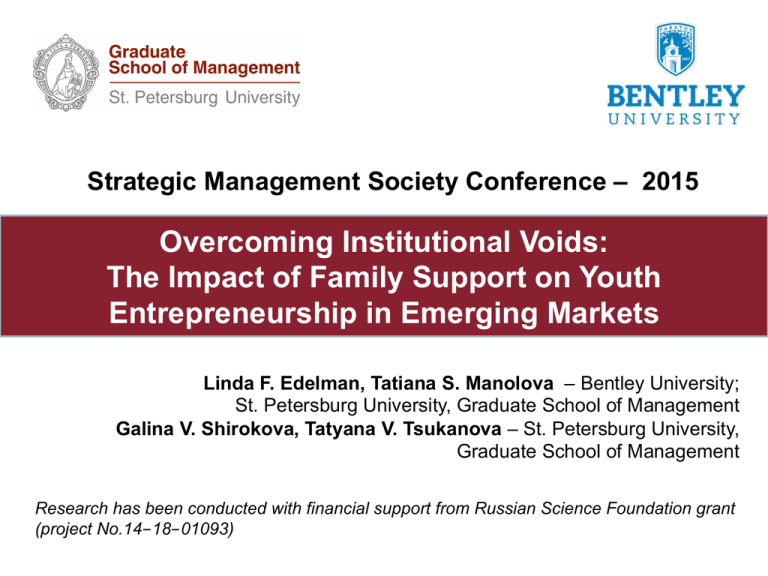
Strategic Management Society Conference – 2015 Overcoming Institutional Voids: The Impact of Family Support on Youth Entrepreneurship in Emerging Markets Linda F. Edelman, Tatiana S. Manolova – Bentley University; St. Petersburg University, Graduate School of Management Galina V. Shirokova, Tatyana V. Tsukanova – St. Petersburg University, Graduate School of Management Research has been conducted with financial support from Russian Science Foundation grant (project No.14-18-01093) Research Motivation § The absence of specialized intermediaries, regulatory systems and contract-enforcing mechanisms, more commonly known as institutional voids, plagues emerging markets [Khanna and Palepu, 1997] § There is a need for a compensatory social structure to spur market formation and operation [Khanna and Palepu, 1997; Greif, 2006] § Serious dilemma for entrepreneurs starting new ventures in these contexts 2 Research Questions § Does the family play a significant role in university students’ nascent entrepreneurial activity? Is the strength of the relationship contingent on the country’s level of institutional development? § Findings suggest: - entrepreneurs who engage in more start-up activities are more likely to end up with a viable new venture [Carter et al., 1996; Brush et al., 2008] - family helps nascent entrepreneurs to get access to resources [Van Auken and Neeley, 1996; Steier, 2007] - the benefits of family involvement are magnified under weak institutional regimes [Luo and Chung, 2013] 3 Family & Institutional Embeddedness Perspectives § The family embeddedness of entrepreneurship perspective [Aldrich and Cliff, 2003; Granovetter, 1985] suggests that entrepreneurs and their families are not separate entities, and that family support in the form of family resources, financial and social, can be instrumental in the start-up of the new venture § § Entrepreneurial activity is embedded in an institutional context Families are a critical source of start-up capital in all institutional environments, but they become essential funding sources in countries with underdeveloped capital markets The family reputation, connections, and referrals are indispensable in bridging the “voids” in the formal institutional infrastructure [Khavul, § Bruton, and Wood, 2009] 4 The Role of Family Support § University students are locked out of most of the traditional channels for getting early stage financial capital [Ozgen and Minsky, 2013]. They typically acquire early stage funding from friends and family [Van Auken and Neeley, 1996] § Family social capital may have a strong influence on the venture creation process [Aldrich and Cliff, 2003; Renzulli et al, 2000; Steier, 2007] H1a: The greater the family support, in the form of financial capital, the greater the scope of start-up activities undertaken by the young nascent entrepreneur. H1b: The greater the family support, in the form of social capital, the greater the scope of start-up activities undertaken by the young nascent entrepreneurs. 5 The Role of Family Support & Institutional Environment § The lack of formal marketbased institutions can increase the role of informal family financial and social ties and serve as a substitute for market intermediaries in emerging economies by providing quality and timely information and by facilitating transactions [Chang and Choi, 1988; Khanna and Palepu, 1997; Peng, 2003] H2a: The weaker the country’s level of institutional development, the stronger the effect of family financial capital on the scope of start-up activities undertaken by the young nascent entrepreneur. H2b:The weaker the country’s level of institutional development, the stronger the effect of family social capital on the scope of start-up activities undertaken by the young nascent entrepreneur 6 Method Sample & descriptive statistics § Data from the 2011 Global University Entrepreneurial Spirit Students’ Survey (GUESSS), a biannual online survey of students § 31,429 students (nascent entrepreneurs) from 20 countries: 11 developed & 9 emerging economies § Students were on average 24 years old, 47% of them were female, 54% were from entrepreneurial families Statistical procedure § IVs: financial capital (3 items, factor scores), social capital (2 items, factor scores), international property rights index (IPRI) § DV is a count of start-up activities § Hierarchical Poisson Regression (STATA) 7 Our Results are Mixed § Financial capital was significant, but negatively related to start-up activities (H1a – rejected) - § Ambivalent support for hypothesis H2a - The higher the family support in the form of financial capital, the lower the scope of start-up activities Social capital was significant and positively related to start-up activities (H1b – supported) - § The higher the family support in the form of social capital, the higher the scope of start-up activities § The effect of family financial support was indeed stronger at lower levels of institutional development (as H2a predicted), but in a direction opposite to H1a The interaction between family social capital and the IPRI variable was negative and statistically significant, diminishing the positive effect of family capital on the start-up activities of students (H2b – supported) - The effect of family social capital was even stronger at lower levels of institutional development 8 The Role of Family Support Negative impact of family financial capital § Possible that too much financial support may have an adverse effect on the scope of entrepreneurial activities § Data artifact – our DV is a count of start-up activities and one of those activities is “looking for financing”. If the family provides too much financing, then the entrepreneur is less likely to look for money elsewhere Positive impact of family social capital § Family social capital, in the form of social contacts and introduction into social networks, has a consistent positive effect on the scope of startup activities - Strong family ties are both a source of internal or “bonding” social capital and a source of external or “bridging” social capital 9 The Role of Family Support & Institutional Environment § Family financial capital has an even more pronounced negative effect on the scope of nascent activities in the context of emerging economies - - A substitution mechanism may be in place It also points to a certain “cocooning” effect § The effect of family social capital on the scope of nascent entrepreneurs’ startup activity is stronger in the context of weak institutional environments such as those found in emerging economies - Personal referrals and personal trust alleviate the threat of opportunistic behavior and reduce transaction costs 10 Limitations, Future Research Directions & Implications § Limitations and future research directions § § § The implications of different family types on the scope and outcomes of start-up initiatives Focus on panel dataset to infer causal relationships Implications § § for policy makers: to pay closer attention to the role of the family (e.g. programs and tax incentives for enhanced family support of youth entrepreneurs’ start-up activities may be instrumental in directly and indirectly stimulating youth entrepreneurship) for aspiring young entrepreneurs: to carefully calibrate the benefits and costs of soliciting family support in the process of their new venture creation 11 Conclusions § Families have the potential to supply young nascent entrepreneurs with unique forms of capital that enable them to effectively establish firms § The effect of family embeddedness is multifaceted and strongly attenuated by country context Our study starts an interesting conversation on the role of family for youth entrepreneurship. It is our hope that other researchers will join in and enrich this conversation. 12 Thank you for your attention! Questions? 13
